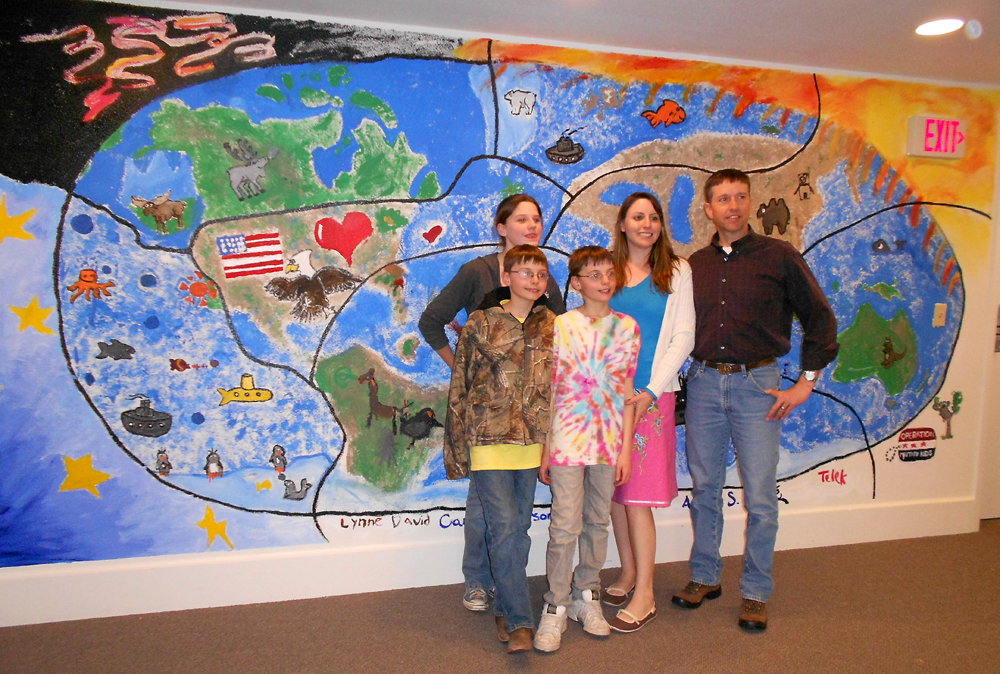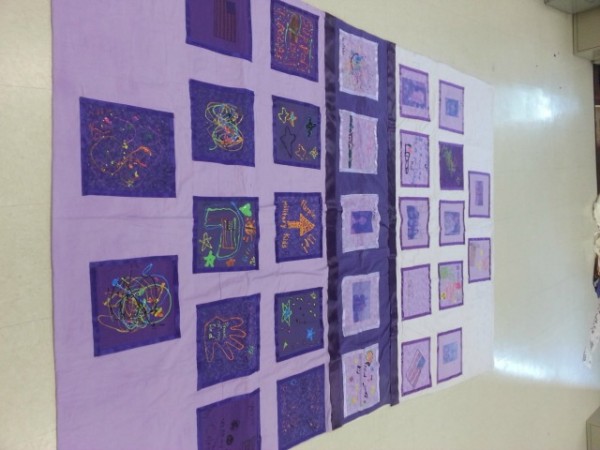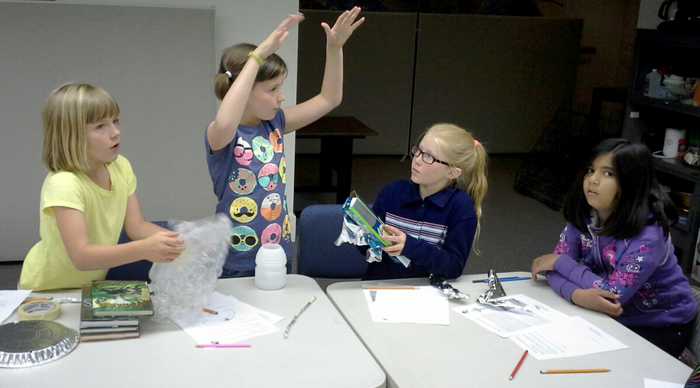Libraries Provide Stability for Military Children and Families
Amid the frequent transitions that military children face, libraries are often a welcoming destination. Librarians have been increasing their efforts to connect these families with a variety of services.

A family at the Operation Military Kids mural unveiling during the
Speak Out With Art Program at the Belgrade, MT, Community Library.
The needs of military-connected students
Research conducted over the past several years has shown that the long deployments associated with the war on terror since 2001 have left military children at a higher risk of negative outcomes, such as depression, substance use, and even thoughts of suicide. A research team at the University of Southern California published a paper in the Journal of Adolescent Health showing that teens with a parent or sibling deployed multiple times are more likely to feel depressed or have thoughts of suicide than those who have experienced only one deployment. The researchers also found that when the teens changed schools two or more times within a five-year period, they are more likely to be bullied and to be involved with weapons. A similar study at the University of Iowa found an increase in alcohol and drug use among military children whose parents were deployed or had recently returned. Reintegration—the period after a soldier comes home—can sometimes cause just as much disruption as when he or she left. “We worry a lot about the servicemen and women, and we sometimes forget that they are not the only ones put into harm’s way by deployment—their families are affected, too,” Stephan Arndt, the professor who led the Iowa study, stated in a press release. “Our findings suggest we need to provide these families with more community support.”Libraries as a home base
Helping military families access financial services and apply for benefits, offering videoconferencing so kids can connect with a deployed parent, and, of course, creating reading programs for military children are just a few ways that libraries are serving these communities. “For military kids, the summer, a lot of times, means moving,” which can make it hard to participate in a local reading program, says Leah Love, the volunteer training and recruitment coordinator for Blue Star Families. The nonprofit organization provides free resources and services to 1.5 million military families, including children’s books donated by Disney and other partners every year. Blue Star Families’ “chapter directors” typically work with libraries on military installations to share information about their services. Libraries have created far-reaching support systems as well. The Illinois Library Association formed a partnership with the Department of Defense’s Morale, Welfare and Recreation Office called Joining Forces, so that military children can participate in their iREAD summer reading program from anywhere in the world. It has also established a Military Children & Families Toolkit to help libraries develop collections that reflect experiences such as changing schools, missing a parent, and adjusting to life after a parent returns home. In addition, a librarian at the Williamsburg (VA) Regional Library has created an annotated list of books which feature children and teens with parents in the military.Helping students get their bearings
At Bonsall West Elementary School in Oceanside, CA, near Marine Corps Base Camp Pendleton, librarian Mishell Rose has added military books to her collection—not only selections about tanks and helicopters, but also separation. She also has a large international section, because so many students have lived overseas. In addition to children from military families, Bonsall West also serves children whose parents work for military contractors. One, she says, relocated from Dubai and was happy to find a book on the city in the school’s collection. “A school library can be a neutral place where [new students] can get their bearings,” Rose says. She has learned that children in military families often don’t arrive in time for the slow-paced first day of school and are “really confused when they come in,” she says. So Rose created orientation videos to introduce those students to her library. Earlier this year, Bonsall West also opened a reading room to make these children feel comfortable, funded by a grant from the Ben Carson Reading Project, a literacy initiative of the former presidential candidate’s Carson Scholars Fund. The space honors the military families at the school. Bookshelves are draped in camouflage material, Marine flags and other insignias cover the walls, and students can lounge on cushions that look like sand bags, giving the room a bunker appearance. One of the teacher’s husbands even made a bench out of an old jeep.A sense of community and belonging
Children whose parents serve in the National Guard or the Reserves are also impacted by long deployments and sometimes are less likely to receive attention because they live outside the military community and don’t have the same access to services as on military installations. Often, though, children don’t want special attention and just want to blend in with their civilian peers. “We have integrated the military kids into the regular programs,” says Kellie Tomita, the marketing and communications division manager for CCPL, which has eight branches. “One of the things they didn’t like was being singled out.” She adds, however, that the library has increased efforts to recognize members of the military community. For example, staff has invited soldiers to speak to children’s reading clubs, created book displays for the Month of the Military Child, and held a birthday party for the Army with stories and cake. Because many military kids are homeschooled, the library also offers STEAM programs and a science fair, both of which draw a large number of military children. Rebekah Kamp, the youth services librarian at the Belgrade (MT) Community Library, organized Speak Out with Art, which provided teens affected by deployment a chance to express themselves using ceramics, painting, and other forms of artistic expression. The program was open to all teens, so that those from military families could meet others in the community and the civilian teens could learn about military life. Kamp says her library has since held several Month of the Military Child events in April. Everyone wears purple to represent all the colors of the military branches blended together. In November, teens and children might write messages to veterans or bring in pictures of loved ones who have served. Kamp also held a photography exhibit featuring work by National Guard photographers, who brought their equipment in and taught the teens photography skills.
Quilt made by local military youth at the
Belgrade, MT, Community Library.
Engaging the entire family
CCPL used a grant received in 2013 from the State Library of North Carolina to conduct a research project. From interviews and focus groups, the staff learned that military members are unlikely to ask for help for themselves, but will seek it out for their children. So while events for children are highlighted, libraries and schools serving military families often use web links on homescreens, signs, and brochures to discreetly provide information on mental health services, employment, housing, and other resources. “Parents are very concerned about their children’s welfare and will come to the library for services for them,” Jennifer Taft, reference librarian at the Harnett County (NC) Public Library, and Cynthia Olney, the assistant director of the National Network of Libraries of Medicine Evaluation Office, wrote in an article about the work at CCPL for Public Libraries Online. “Once the parents are in the door, they may find resources that will be of use to them as well.”
Parachute challenge program with military kids at the Belgrade, MT, Community Library.
On a national level, libraries are partnering with organizations to provide military families with greater access to services. For example, in March 2016, the American Library Association (ALA) announced a collaboration with the National Foundation for Credit Counseling to provide financial education programs to active duty and veteran families. While many of the services will be provided in a group setting, families will also have the option of receiving individual counseling, says Larra Clark, the deputy director of ALA’s Office for Information Technology Policy. So far, library systems in 18 states and the District of Columbia (and the El Dorado High School library in Placerville, CA) have signed on. The Institute for Museum and Library Services has also indicated that as part of its Fiscal Year 2017 budget, it plans to increase services for military and veteran families. Research has shown that military children weather the frequent moves better when their parents, especially their mothers, maintain positive attitudes. A 2007 study by researchers at Vanderbilt University showed that military children experience fewer negative effects when changing schools if they have “rich social support networks” and access to information about the community and the school where they are moving. By providing a predictable environment, Kamp believes, libraries are key to this sense of stability. “Each library is a little different,” she says, “but it can be a familiar place.”RELATED
RECOMMENDED
CAREERS
The job outlook in 2030: Librarians will be in demand
CAREERS
The job outlook in 2030: Librarians will be in demand
ALREADY A SUBSCRIBER? LOG IN
We are currently offering this content for free. Sign up now to activate your personal profile, where you can save articles for future viewing






Add Comment :-
Comment Policy:
Comment should not be empty !!!
Nan Barker
Having served as the librarian on an Army post in Germany for the past 9 years, I totally agree that the military family has unique needs and desires, especially those living overseas. We are of course the only English-language choice for the families posted here in Hohenfels and surrounding villages, and our goal is to provide the same kind of library services which they would find in the US, or better! We have story times, summer reading programs, book clubs, Lego clubs, Battle of the Books, crafts, and more! While the frequent moving away of our sweet little story time regulars causes us some weepy moments, we are over joyed to meet and get to know the new families always joining us. These families are true heroes.Posted : Sep 07, 2016 07:48